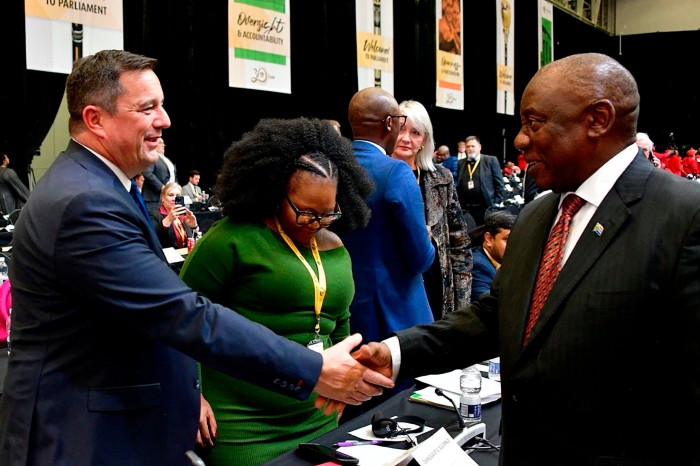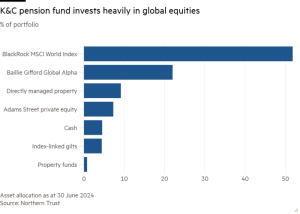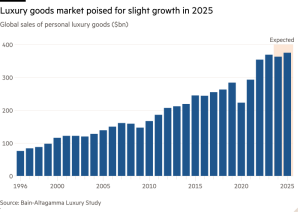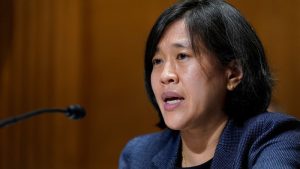Julius Malema slams ‘back-stabbing’ Jacob Zuma as South African left reshapes

South Africa’s populist firebrand Julius Malema has lashed out at his old rival Jacob Zuma as a “back stabber”, as he sought to scotch speculation that his leftist movement could soon merge with the former president’s upstart party.
Malema, whose Economic Freedom Fighters marked him out as the radical agitator of the country’s opposition, has been rattled by a number of recent defections to Zuma’s one-year-old political party, which defied expectations to win nearly 15 per cent in May’s election.
Speaking to the Financial Times, Malema dismissed the idea of coming together with Zuma’s uMkhonto weSizwe (MK) to unite the radical opposition, even though both parties champion stripping land from whites without payment, and nationalising mines and banks. The ruling African National Congress, which was forced to enter a coalition with the Democratic Alliance after its vote tumbled to close to 40 per cent, is now increasingly centrist.
“To work with President Zuma is to stab yourself in the back because he’s not honest,” he said. “I feel sorry for those who left the EFF thinking they can outmanoeuvre him [in search of] greener pastures. When he’s done with them, he’s going to dump them,” he said, in an attack laced with vulgar and sexual language.
EFF co-founder Floyd Shivambu and chair Dali Mpofu have recently decamped to MK. Shivambu said last week that the defectors found a “superior alternative” in Zuma’s party, rather than “small unviable fiefdoms that have got no potential”.
Malema said those leaving his party wanted to “assassinate” the EFF. “Leaders have been assassinated before by those who are close to them.”
He said MK’s policies were not “leftist”, adding that the party was “taking advantage of a racially polarised society to create the impression it is on the side of the oppressed”.
MK celebrated its first birthday this weekend, but its brief tenure has been chaotic. The party axed 18 of its own MPs within a month of them being sworn into parliament, as well as its co-founder Jabulani Khumalo.
Zuma, who led the ANC from 2007 and was the country’s president from 2009-18, was last month permanently expelled from it for his “direct assault” in starting a rival party.
Malema, another ANC outcast, said those who left the EFF to join MK would be left out in the cold, just like those who helped Zuma withstand internal opposition and a series of corruption allegations on his ascent to the top of the ruling party.
“Give me an example of those who were close to Zuma and supported him during his corruption trial, and show me one who is close to him today. I don’t know why these comrades can’t learn,” he said.
For its part, MK said Malema’s flat rejection of a merger between the two parties is premature.
“Never say never,” chair Nathi Nhleko told the FT. “That view has not been subjected to a test, and the test in this instance is time.”

Nhleko said there was much commonalty between the parties, including the fact that they both believe the grand coalition government — formed of the ANC, Democratic Alliance and eight other parties — was not the answer to the country’s problems.
“A government of national unity is a disguise for a coalition between the ANC and the DA. But policy-wise, there is no common set of principles and values,” he said. “That government does not address the issue of Blacks being at the lowest rung of the social and economic ladder.”
Nhleko said the party’s trajectory since its inception is unprecedented. “It tells you about the mood in the country,” he said.
Still, critics have attributed the defections from the EFF partly to Malema’s dictatorial leadership style. The EFF will hold its new round of elections in the next week, and Malema, who has been its leader since the party was founded in 2013, is set to keep that role.
Malema said if his “dictatorial style” was the reason people left the EFF for Zuma, it would be like “leaving a cheater in a marriage for a polygamist”.
“Ask any of those who left which party has the best internal democratic practices. In MK, there is no such thing. My view might be dominant, but at the end of the day, we have internal processes to elect the leadership,” he said.
Ralph Mathekga, a political analyst, said the EFF and MK lean heavily on their two leaders’ charisma.
“You can call Zuma’s party leftist, but its actual ideology is secondary to the fact that its primary characteristic is that it’s a nationalist party based around Zuma and his grievance with the ANC,” he said.
Mathekga said MK’s surge has also hinged on strong ethnic support among Zulu speakers in one province, Kwazulu-Natal, and the test is whether that can translate into nationwide backing.
“MK will struggle, and in the end, it may face the same diminished relevance that the EFF is battling to reverse now,” he said.
Mathekga said neither party had demonstrated the temperament to govern, optimistically positioning themselves for a radical correction in the political system.
“These are anti-establishment parities that haven’t shown any inclination to govern democratically,” he said.
#Julius #Malema #slams #backstabbing #Jacob #Zuma #South #African #left #reshapes





